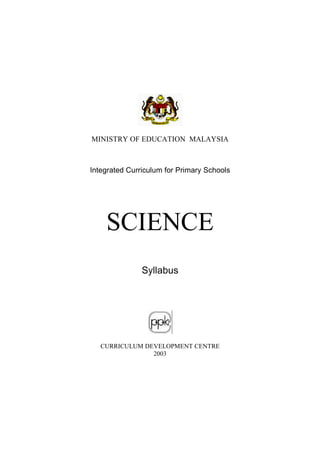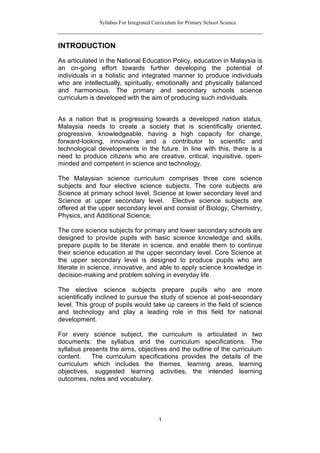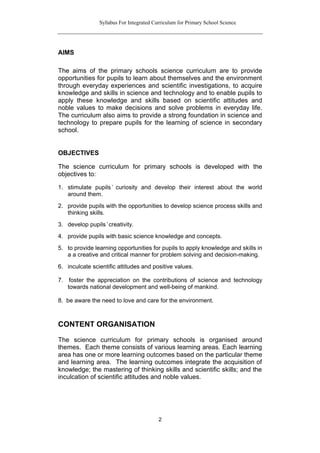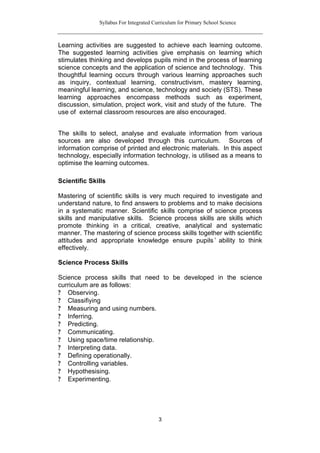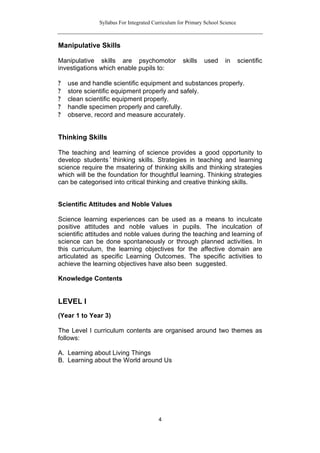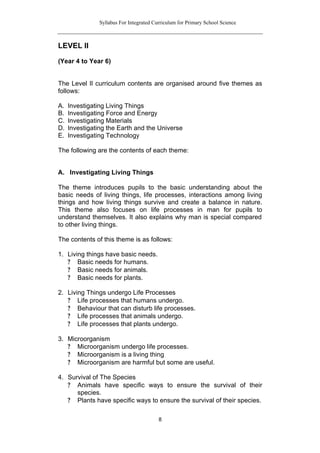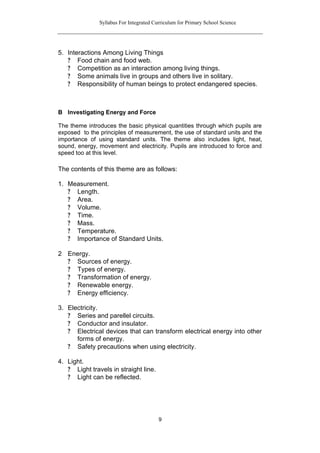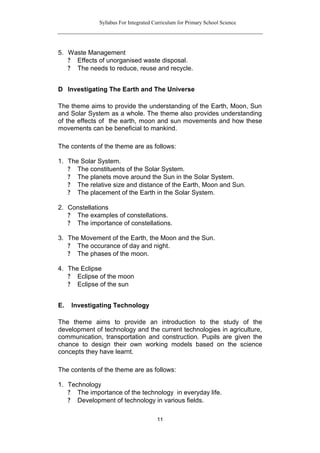Sp science primary_school
- 1. MINISTRY OF EDUCATION MALAYSIA Integrated Curriculum for Primary Schools SCIENCE Syllabus CURRICULUM DEVELOPMENT CENTRE 2003
- 2. THE NATIONAL PHILOSOPHY Our nation, Malaysia, is dedicated to achieving a greater unity of all her peoples; to maintaining a democratic way of life; to creating a just society in which the wealth of the nation shall be equitably shared; to ensuring a liberal approach to her rich and diverse cultural traditions; to building a progressive society which shall be oriented toward modern science and technology; We, her peoples, pledge our united efforts to attain these ends guided by the following principles: BELIEF IN GOD LOYALTY TO KING AND COUNTRY SUPREMACY OF THE CONSTITUTION RULE OF LAW GOOD BEHAVIOUR AND MORALITY
- 3. NATIONAL PHILOSOPHY OF EDUCATION Education in Malaysia is an on-going effort towards further developing the potential of individuals in a holistic and integrated manner, so as to produce individuals who are intellectually, spiritually, emotionally and physically balanced and harmonious based on a firm belief in and devotion to God. Such an effort is designed to produce Malaysian citizens who are knowledgeable and competent, who possess high moral standards and who are responsible and capable of achieving a high level of personal well- being as well as being able to contribute to the betterment of the family, society and the nation at large.
- 4. NATIONAL SCIENCE EDUCATION PHILOSOPHY In consonance with the National Education Philosophy, science education in Malaysia nurtures a Science and Technology Culture by focusing on the development of individuals who are competitive, dynamic, robust and resilient and able to master scientific knowledge and technological competency.
- 5. PREFACE Science and technology plays a crucial role in meeting MalaysiaŌĆÖ s aspiration to become a developed nation. Therefore, the provision of quality science education from an early age in the education process is of paramount importance. The syllabus as outlined in this document has been designed to provide opportunities for students to acquire scientific knowledge and skills. It also seeks to inculcate noble values and love for the nation towards developing a future generation which is capable of contributing to the harmony and prosperity of the nation and its people. The curriculum aims at producing active learners. The pupils are given ample opportunities to observe, ask questions, formulate and test hypotheses, analyse, interprete data, report and evaluate findings. Throughout the investigative learning process, the pupils will be encouraged to apply science process skills, thinking skills and thinking strategies for thoughtful learning. The teaching of Science using English as the medium of instruction enables pupils to obtain various sources of information written in English either in electronic or print forms and helps them to keep abreast of developments in science and technology. Pupils will be able to see science and technology in a wider context and learn to relate their knowledge to the world beyond their school. This syllabus is the work of many individuals and experts in the field. On behalf of the Ministry of Education, I would like to express my deepest appreciation to those who have given their vital support and contributed in one way or another on this effort. (MAHZAN BIN BAKAR SMP, AMP) Director Curriculum Development Centre Ministry of Education, Malaysia
- 6. Syllabus For Integrated Curriculum for Primary School Science INTRODUCTION As articulated in the National Education Policy, education in Malaysia is an on-going effort towards further developing the potential of individuals in a holistic and integrated manner to produce individuals who are intellectually, spiritually, emotionally and physically balanced and harmonious. The primary and secondary schools science curriculum is developed with the aim of producing such individuals. As a nation that is progressing towards a developed nation status, Malaysia needs to create a society that is scientifically oriented, progressive, knowledgeable, having a high capacity for change, forward-looking, innovative and a contributor to scientific and technological developments in the future. In line with this, there is a need to produce citizens who are creative, critical, inquisitive, open- minded and competent in science and technology. The Malaysian science curriculum comprises three core science subjects and four elective science subjects. The core subjects are Science at primary school level, Science at lower secondary level and Science at upper secondary level. Elective science subjects are offered at the upper secondary level and consist of Biology, Chemistry, Physics, and Additional Science. The core science subjects for primary and lower secondary schools are designed to provide pupils with basic science knowledge and skills, prepare pupils to be literate in science, and enable them to continue their science education at the upper secondary level. Core Science at the upper secondary level is designed to produce pupils who are literate in science, innovative, and able to apply science knowledge in decision-making and problem solving in everyday life. The elective science subjects prepare pupils who are more scientifically inclined to pursue the study of science at post-secondary level. This group of pupils would take up careers in the field of science and technology and play a leading role in this field for national development. For every science subject, the curriculum is articulated in two documents: the syllabus and the curriculum specifications. The syllabus presents the aims, objectives and the outline of the curriculum content. The curriculum specifications provides the details of the curriculum which includes the themes, learning areas, learning objectives, suggested learning activities, the intended learning outcomes, notes and vocabulary. 1
- 7. Syllabus For Integrated Curriculum for Primary School Science AIMS The aims of the primary schools science curriculum are to provide opportunities for pupils to learn about themselves and the environment through everyday experiences and scientific investigations, to acquire knowledge and skills in science and technology and to enable pupils to apply these knowledge and skills based on scientific attitudes and noble values to make decisions and solve problems in everyday life. The curriculum also aims to provide a strong foundation in science and technology to prepare pupils for the learning of science in secondary school. OBJECTIVES The science curriculum for primary schools is developed with the objectives to: 1. stimulate pupilsŌĆÖ curiosity and develop their interest about the world around them. 2. provide pupils with the opportunities to develop science process skills and thinking skills. 3. develop pupilsŌĆÖcreativity. 4. provide pupils with basic science knowledge and concepts. 5. to provide learning opportunities for pupils to apply knowledge and skills in a a creative and critical manner for problem solving and decision-making. 6. inculcate scientific attitudes and positive values. 7. foster the appreciation on the contributions of science and technology towards national development and well-being of mankind. 8. be aware the need to love and care for the environment. CONTENT ORGANISATION The science curriculum for primary schools is organised around themes. Each theme consists of various learning areas. Each learning area has one or more learning outcomes based on the particular theme and learning area. The learning outcomes integrate the acquisition of knowledge; the mastering of thinking skills and scientific skills; and the inculcation of scientific attitudes and noble values. 2
- 8. Syllabus For Integrated Curriculum for Primary School Science Learning activities are suggested to achieve each learning outcome. The suggested learning activities give emphasis on learning which stimulates thinking and develops pupils mind in the process of learning science concepts and the application of science and technology. This thoughtful learning occurs through various learning approaches such as inquiry, contextual learning, constructivism, mastery learning, meaningful learning, and science, technology and society (STS). These learning approaches encompass methods such as experiment, discussion, simulation, project work, visit and study of the future. The use of external classroom resources are also encouraged. The skills to select, analyse and evaluate information from various sources are also developed through this curriculum. Sources of information comprise of printed and electronic materials. In this aspect technology, especially information technology, is utilised as a means to optimise the learning outcomes. Scientific Skills Mastering of scientific skills is very much required to investigate and understand nature, to find answers to problems and to make decisions in a systematic manner. Scientific skills comprise of science process skills and manipulative skills. Science process skills are skills which promote thinking in a critical, creative, analytical and systematic manner. The mastering of science process skills together with scientific attitudes and appropriate knowledge ensure pupilsŌĆÖ ability to think effectively. Science Process Skills Science process skills that need to be developed in the science curriculum are as follows: ? Observing. ? Classifiying ? Measuring and using numbers. ? Inferring. ? Predicting. ? Communicating. ? Using space/time relationship. ? Interpreting data. ? Defining operationally. ? Controlling variables. ? Hypothesising. ? Experimenting. 3
- 9. Syllabus For Integrated Curriculum for Primary School Science Manipulative Skills Manipulative skills are psychomotor skills used in scientific investigations which enable pupils to: ? use and handle scientific equipment and substances properly. ? store scientific equipment properly and safely. ? clean scientific equipment properly. ? handle specimen properly and carefully. ? observe, record and measure accurately. Thinking Skills The teaching and learning of science provides a good opportunity to develop studentsŌĆÖ thinking skills. Strategies in teaching and learning science require the msatering of thinking skills and thinking strategies which will be the foundation for thoughtful learning. Thinking strategies can be categorised into critical thinking and creative thinking skills. Scientific Attitudes and Noble Values Science learning experiences can be used as a means to inculcate positive attitudes and noble values in pupils. The inculcation of scientific attitudes and noble values during the teaching and learning of science can be done spontaneously or through planned activities. In this curriculum, the learning objectives for the affective domain are articulated as specific Learning Outcomes. The specific activities to achieve the learning objectives have also been suggested. Knowledge Contents LEVEL I (Year 1 to Year 3) The Level I curriculum contents are organised around two themes as follows: A. Learning about Living Things B. Learning about the World around Us 4
- 10. Syllabus For Integrated Curriculum for Primary School Science The following are the contents for each theme: A. Learning About Living Things The theme introduces pupils to living things and non-living things. Pupils learn about themselves, animals and plants around them. Pupils also learn about senses, good health, good habits and some of the life processes that humans undergo. The contents of this theme are as follows: 1. Ourselves. ? The names of different parts of the body. ? The five senses and the part of the body linked with each sense. ? Linking good health with good habits. ? There are different types of food. ? Linking eating good foods with good health. ? We need food and water to stay alive. ? We need to eat different kinds of food to be healthy. ? We grow and change as we grow older. 2. Animals ? The names of different animals ? The names of different parts of animals. ? Where animals live. ? What animals need to live. ? The different foods that animals eat. ? Animals grow. ? External features of animals. ? Animals can be grouped according to external features. ? Animals can be grouped in many ways. 3. Plants ? The names of different plants. ? The names of different parts of plants. ? Plants need water to grow. ? Plants need sunlight to grow. ? Plants grow. ? Plants need the right amount of water for healthy growth. ? Flowering plants produce seeds which grow into new plants. ? External features of plants. ? Plants can be grouped according to external features. ? Plants can be grouped in many ways. 5
- 11. Syllabus For Integrated Curriculum for Primary School Science 4. Living Things and Non Living Things ? Make observations and use information to group things into living things and non-living things. B. Learning About The World Around Us The theme introduces pupils to the senses of sight, touch, smell, hearing and taste. Pupils also learn about batteries, magnet, light, soil and force. Pupils learn about properties of materials such as sink and float, absorption and magnetism 1. Using Our Senses ? About different colours. ? About different shapes. ? About different sizes. ? Grouping objects using different criteria. ? About different sounds. ? About different smells. ? About different tastes. ? About different properties and conditions of materials through touch. ? Using senses to identify objects. 2. Finding Out about Thing that Float and Sink ? Some things float and some things sink. 3. Finding Out About light and Dark ? About light and dark. 4. Long or Short. ? Observe and compare lengths. ? Measure length using non-standard tools. 5. The Magic of Batteries ? About things that use batteries. ? How to use a battery. ? How to make a complete circuit. 6. Mixing Things ? Some materials can dissolve in water and some cannot. 7. Push and Pull ? Pushing and pulling can change the shape of objects. ? Pushing or pulling can make things speed up, slow down or change direction. ? Making predictions and to test them. 6
- 12. Syllabus For Integrated Curriculum for Primary School Science 8. Magnets ? Magnets can attract or repel each other. ? The need to handle magnets properly. ? Magnets attract some materials. ? Magnets have different strengths. ? The different uses of magnets. 9. Electricity ? How to make a bulb in a circuit brighter or dimmer. ? Some materials conduct electricity. ? A switch is used to complete or break a circuit. 10. Springs ? A spring will return to its original size and shape after being bent, twisted, stretched or squeezed. ? Springs stretch differently. ? The uses of springs. 11. Absorption ? Some materials can absorb water. ? Some materials can absorb more water than others. ? The uses of the ability of materials to absorb water. 12. Soil ? What soil is made of. ? The flow of water through different types of soil. ? Certain soils are more suitable for plant growth. 13. Mixing Substances ? Different substances have different properties. ? Some substances are unsafe and should be handled with care. ? A mixture of substances can be separated. 7
- 13. Syllabus For Integrated Curriculum for Primary School Science LEVEL II (Year 4 to Year 6) The Level II curriculum contents are organised around five themes as follows: A. Investigating Living Things B. Investigating Force and Energy C. Investigating Materials D. Investigating the Earth and the Universe E. Investigating Technology The following are the contents of each theme: A. Investigating Living Things The theme introduces pupils to the basic understanding about the basic needs of living things, life processes, interactions among living things and how living things survive and create a balance in nature. This theme also focuses on life processes in man for pupils to understand themselves. It also explains why man is special compared to other living things. The contents of this theme is as follows: 1. Living things have basic needs. ? Basic needs for humans. ? Basic needs for animals. ? Basic needs for plants. 2. Living Things undergo Life Processes ? Life processes that humans undergo. ? Behaviour that can disturb life processes. ? Life processes that animals undergo. ? Life processes that plants undergo. 3. Microorganism ? Microorganism undergo life processes. ? Microorganism is a living thing ? Microorganism are harmful but some are useful. 4. Survival of The Species ? Animals have specific ways to ensure the survival of their species. ? Plants have specific ways to ensure the survival of their species. 8
- 14. Syllabus For Integrated Curriculum for Primary School Science 5. Interactions Among Living Things ? Food chain and food web. ? Competition as an interaction among living things. ? Some animals live in groups and others live in solitary. ? Responsibility of human beings to protect endangered species. B Investigating Energy and Force The theme introduces the basic physical quantities through which pupils are exposed to the principles of measurement, the use of standard units and the importance of using standard units. The theme also includes light, heat, sound, energy, movement and electricity. Pupils are introduced to force and speed too at this level. The contents of this theme are as follows: 1. Measurement. ? Length. ? Area. ? Volume. ? Time. ? Mass. ? Temperature. ? Importance of Standard Units. 2 Energy. ? Sources of energy. ? Types of energy. ? Transformation of energy. ? Renewable energy. ? Energy efficiency. 3. Electricity. ? Series and parellel circuits. ? Conductor and insulator. ? Electrical devices that can transform electrical energy into other forms of energy. ? Safety precautions when using electricity. 4. Light. ? Light travels in straight line. ? Light can be reflected. 9
- 15. Syllabus For Integrated Curriculum for Primary School Science 5. Heat. ? Heat and temperature. ? Effect of heat on matter. 6. Force and movement. ? The effect of force. ? Frictional force. ? Speed. C Investigating Materials This theme aims to provide pupils the opportunities to investigate natural materials and man-made materials. Pupils use their knowledge about physical properties of materials and relate them to their use. The theme also includes the study of the formation of clouds and rains. Acid, alkali and neutral substances are also introduced. It also enable pupils to understand how things around them rust and how food are preserved. Finally an exposure to issues on waste disposal will create an awareness that man needs to play a responsible role in an effort to manage nature wisely. The contents of the theme are as follows: 1. Properties of materials. ? Properties of materials. ? The use of materials based on their properties. ? Certain materials can rust. ? Prevention of rusting. 2. Acid and Alkali. ? Properties of acidi and alkali. ? The effects of acidic, alkaline and neutral solutions on litmus paper. 3. Solid, Liquid and Gas. ? The three states of matter. ? Changes in state of matter. ? Water recycle. ? Cleanliness of water resources. 4. Food Preservation. ? Fungi and bacteria actions on food. ? Ways to preserve food. 10
- 16. Syllabus For Integrated Curriculum for Primary School Science 5. Waste Management ? Effects of unorganised waste disposal. ? The needs to reduce, reuse and recycle. D Investigating The Earth and The Universe The theme aims to provide the understanding of the Earth, Moon, Sun and Solar System as a whole. The theme also provides understanding of the effects of the earth, moon and sun movements and how these movements can be beneficial to mankind. The contents of the theme are as follows: 1. The Solar System. ? The constituents of the Solar System. ? The planets move around the Sun in the Solar System. ? The relative size and distance of the Earth, Moon and Sun. ? The placement of the Earth in the Solar System. 2. Constellations ? The examples of constellations. ? The importance of constellations. 3. The Movement of the Earth, the Moon and the Sun. ? The occurance of day and night. ? The phases of the moon. 4. The Eclipse ? Eclipse of the moon ? Eclipse of the sun E. Investigating Technology The theme aims to provide an introduction to the study of the development of technology and the current technologies in agriculture, communication, transportation and construction. Pupils are given the chance to design their own working models based on the science concepts they have learnt. The contents of the theme are as follows: 1. Technology ? The importance of the technology in everyday life. ? Development of technology in various fields. 11
- 17. Syllabus For Integrated Curriculum for Primary School Science ? How technology can be used to solve problems. ? Using technology wisely to benefit mankind. 2. Strength and Stability. ? Shapes of objects. ? Strength and stability of a structure. 3. Machines. ? Simple machine. ? Complex machines. ? Invention of machine to make life easier. 12

